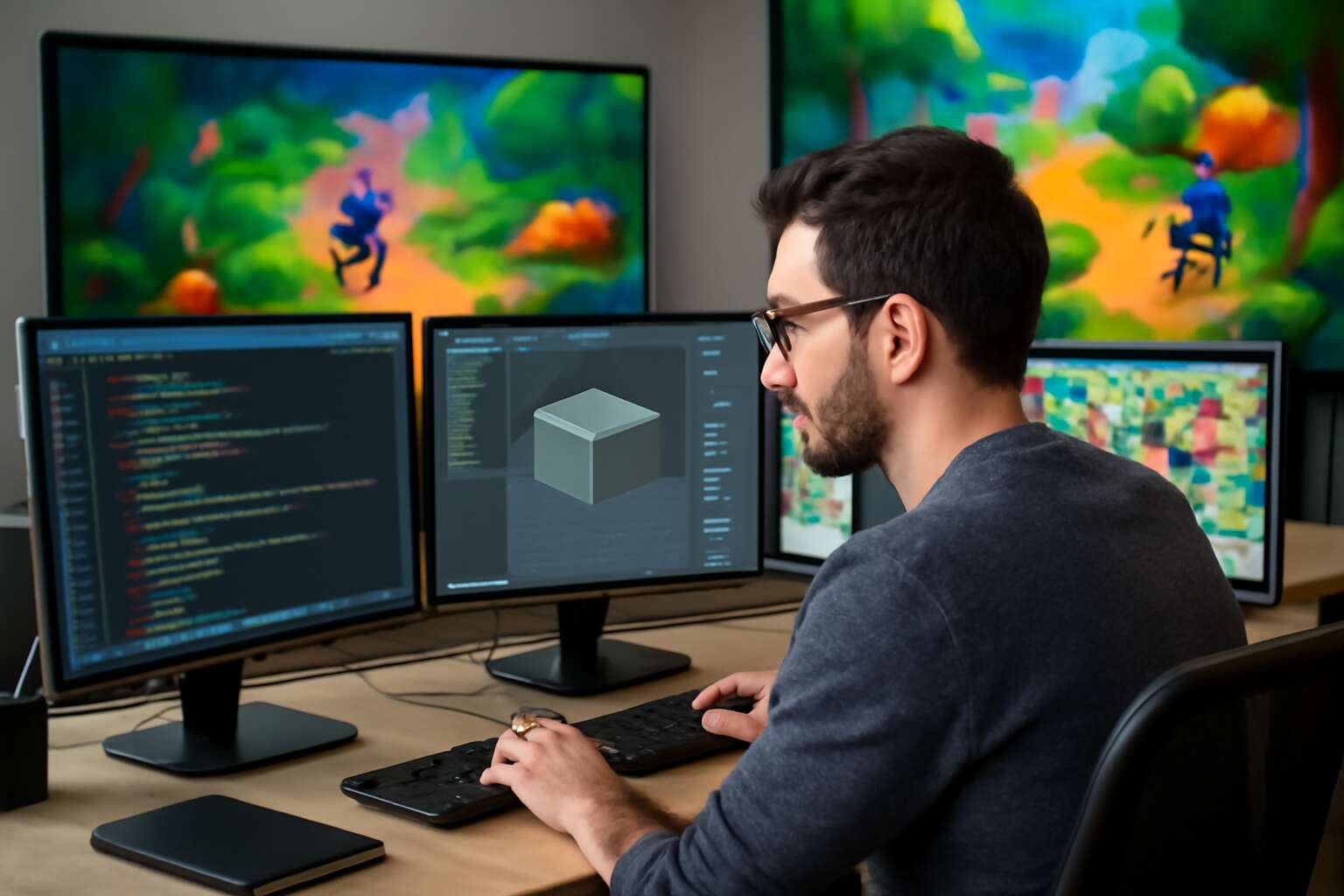Understanding Full Stack Developers
What is a Full Stack Developer?
Contrary to popular belief, being a full stack developer isn’t just about juggling front-end flair and back-end bravado. It’s a versatile role that covers the entire spectrum of web development, and yes, that includes game creation! According to recent industry insights, many full stack developers are surprisingly capable of making games, thanks to their broad skill set and adaptable mindset.
So, what exactly is a full stack developer? Simply put, they’re the Swiss Army knives of the coding world—masters of both the visual and the structural. From designing user interfaces that dazzle to architecting server-side logic that keeps everything running smoothly, they wear many hats. This versatility raises an interesting question: can full stack developers make games? The answer is a resounding yes! With a little extra creativity and some additional game development knowledge, they can craft engaging gaming experiences from scratch.
- Proficiency in programming languages like JavaScript, Python, or C#.
- Experience with game engines such as Unity or Unreal Engine.
- Understanding of graphics rendering, physics, and user experience design.
Key Skills and Technologies of Full Stack Developers
Understanding the core skills and technologies of full stack developers reveals why many are surprisingly equipped to venture into game development. At their essence, full stack developers possess a keen command of programming languages such as JavaScript, Python, and C#, enabling them to navigate both client and server-side challenges with ease. This linguistic versatility is a crucial asset when exploring whether a full stack developer can make games, as game creation often demands mastery over multiple coding paradigms.
Beyond programming languages, proficiency with game engines like Unity or Unreal Engine is pivotal. These powerful tools serve as the digital canvas where imagination meets technical prowess. Additionally, a solid grasp of graphics rendering, physics simulation, and user experience design is vital for crafting immersive gaming environments. Interestingly, some full stack developers even utilise their knowledge of web development frameworks to build browser-based games, demonstrating the expansive potential of their skill set.
- Programming skills in JavaScript, Python, or C#
- Experience with game engines such as Unity or Unreal Engine
- Understanding of graphics rendering and physics
- User experience design tailored for gaming interfaces
So, when pondering whether a full stack developer can make games, the answer is unequivocally yes. Their adaptable toolkit and creative mindset make them well-suited for the challenges of game development—proving that the versatility of a full stack developer extends far beyond traditional web applications.
Common Tasks and Responsibilities
Full stack developers are often the unsung heroes of the tech world, juggling everything from backend databases to captivating user interfaces. But can full stack developer make games? The answer is a resounding yes! Their breadth of experience equips them with a unique skill set that’s surprisingly well-suited for game development’s multifaceted demands.
Typically, a full stack developer’s common tasks include designing and implementing server-side logic, creating responsive interfaces, and ensuring seamless integration between front and back end. These responsibilities require a versatile mind and a knack for problem-solving, which are just as vital in crafting engaging games as they are in web applications.
When venturing into game development, full stack developers often wear multiple hats—programmer, designer, and sometimes even a bit of an artist. Their responsibilities may involve:
- Developing game mechanics using familiar programming languages like JavaScript, Python, or C#
- Creating immersive environments by mastering graphics rendering and physics simulations
- Optimising user experience to keep players hooked and returning for more
This diverse toolkit means that, yes, a full stack developer can make games—sometimes even transforming a browser-based project into a full-blown gaming experience. Their ability to navigate complex technical terrains makes game creation less of a leap and more of an exciting extension of their existing expertise.
Can Full Stack Developers Make Games?
Overview of Game Development Requirements
In the bustling realm of digital creativity, a common question echoes with curiosity: can full stack developer make games? The answer isn’t as straightforward as a simple yes or no. While full stack developers are often celebrated for their versatility across front-end and back-end development, creating a game demands a specialised blend of skills—ranging from graphics programming to real-time user interaction. Intriguingly, many full stack developers possess a foundation that could, with the right dedication, be channelled into game development.
Developing a game, after all, is akin to orchestrating a symphony—requiring mastery over graphics engines, physics simulations, and seamless UI design. For a full stack developer to transition into game creation, they must often acquire knowledge of game engines such as Unity or Unreal, understand scripting languages like C# or C++, and grasp the intricacies of game mechanics. The question remains: can full stack developer make games? Absolutely, provided they are willing to stretch their skill set beyond traditional web development into the colourful universe of interactive entertainment. In essence, the potential is there—it’s all about the passion and willingness to learn the nuances of game development.
Are Full Stack Skills Sufficient for Game Development?
Within the vast tapestry of digital craftsmanship, a question persists like a shimmering thread: can full stack developer make games? The answer is both complex and inspiring. While full stack developers possess a formidable arsenal of skills—ranging from crafting seamless user interfaces to managing complex databases—the realm of game development introduces a different universe altogether. It demands mastery over real-time rendering, physics engines, and immersive storytelling, elements that stretch beyond traditional web development.
Nevertheless, many full stack developers hold the foundational knowledge to venture into game creation. With dedication and a thirst for learning, they can harness powerful tools such as Unity or Unreal Engine, and scripting languages like C# or C++. The journey is akin to forging a new myth; it involves expanding one’s skill set into areas like graphics programming, physics simulation, and interactive mechanics. So, can full stack developer make games? Certainly—if they are willing to explore the enchanting complexities of game development, their versatility can indeed transform into a new realm of digital artistry.
Benefits of Full Stack Developers Creating Games
In the grand theatre of digital innovation, a curious question persists: can full stack developer make games? The answer is a tantalising blend of yes and perhaps not—yet. Full stack developers, armed with a versatile toolkit of web technologies, have a solid foundation that can be adapted for game creation. Their understanding of user interfaces, server management, and databases provides a unique vantage point in the game development landscape. However, the realm of gaming introduces specialised challenges—real-time rendering, physics engines, and immersive storytelling—that demand additional mastery.
That said, many full stack developers possess the intellectual curiosity and resilience to venture into game development. With dedication, they can leverage game engines such as Unity or Unreal Engine—powerhouses that transform code into captivating worlds. Whether they pursue skills in C# or C++, or delve into graphics programming, their adaptability can be a game-changer. After all, the question isn’t just can full stack developer make games but rather, how far their curiosity and perseverance will take them in this enchanting domain.
Tools and Technologies Full Stack Developers Use for Game Development
Frontend Technologies for Game Graphics and UI
In the realm of game development, the question often arises: can full stack developer make games? The answer lies not just in their coding prowess but in their mastery of diverse tools and technologies. When delving into frontend technologies for game graphics and UI, full stack developers harness a blend of specialised frameworks and libraries that breathe life into digital worlds. These tools allow for seamless interaction design, vibrant visuals, and immersive experiences that captivate players from the first click.
Popular choices include WebGL for 3D rendering, HTML5 Canvas for 2D graphics, and JavaScript frameworks such as React or Vue.js to craft intuitive interfaces. For game-specific UI, developers turn to libraries like Phaser or PixiJS, which optimise performance and visual fidelity. By combining these frontend technologies, a full stack developer can create visually stunning games that resonate on a human level, proving once again that their comprehensive skill set is more than capable of making games from scratch.
Backend Technologies for Game Logic and Data Management
In the shadowed corridors of game creation, a question lingers: can full stack developer make games? The answer is woven with complexity and dark ingenuity. Beyond their mastery of coding, these developers wield a arsenal of tools and technologies that unlock the depths of digital worlds. Their ability to craft immersive experiences depends on a blend of backend technologies that breathe life into game logic and data management. This unseen realm is crucial—handling player data, game states, and real-time interactions with precision and resilience.
To truly grasp their capabilities, one must look at the array of backend frameworks and databases that full stack developers employ. From server-side languages like Node.js to scalable databases such as MongoDB or PostgreSQL, these elements form the foundation of a game’s persistent world. Indeed, can full stack developer make games? With the right backend architecture, they conjure worlds that are not only enchanting but robust enough to withstand the relentless march of players’ desires.
Game Development Frameworks and Engines
In the labyrinthine realm of game development, the question persists: can full stack developer make games? The answer, cloaked in a tapestry of technological prowess, is a resounding yes—if they wield the right tools and a dash of creative audacity. Their arsenal extends far beyond mere coding; it encompasses a sophisticated suite of tools that facilitate seamless integration of game logic, data management, and user interaction. This versatility is what transforms a generalist into a formidable creator of immersive worlds.
When it comes to game development frameworks and engines, full stack developers often turn to popular options that streamline the process. Engines such as Unity and Unreal offer powerful, user-friendly environments for crafting both 2D and 3D games. Additionally, technologies like Phaser for lightweight browser games and Godot for open-source innovation broaden the horizon of possibilities. These tools, combined with backend technologies like Node.js, MongoDB, or PostgreSQL, enable the creation of scalable, persistent worlds that can handle real-time interactions with finesse.
Additional Tools and Libraries
In the ever-evolving landscape of game development, the question of whether a full stack developer can make games sparks curiosity and admiration. The answer is a confident yes—when equipped with the right tools and a sprinkle of ingenuity. Full stack developers possess a unique versatility, seamlessly bridging the realms of front-end artistry and back-end logic. Their toolkit extends beyond basic coding, encompassing an array of specialised technologies that transform abstract ideas into tangible, immersive worlds.
To bring their visions to life, full stack developers often harness a variety of powerful tools and libraries. For instance, game-specific frameworks like Phaser offer a lightweight yet potent environment for browser-based games, while engines like Godot open doors to both 2D and 3D creations. Meanwhile, backend technologies such as Node.js and databases like MongoDB or PostgreSQL provide the scaffolding for scalable, persistent worlds that support real-time interactions. Integrating these components, they craft seamless experiences that captivate players and push the boundaries of what is possible.
Challenges Faced by Full Stack Developers in Game Development
Real-Time Graphics and Performance Optimization
While the aspiration that a full stack developer can make games is admirable, the reality often reveals intricate hurdles—particularly in the realm of real-time graphics and performance optimisation. Crafting immersive, fluid visuals demands not only a mastery of frontend technologies but also an understanding of rendering pipelines and hardware limitations. These elements become a labyrinthine challenge, especially for developers whose expertise is rooted in web or app development rather than high-performance game engines.
Performance bottlenecks can be a formidable adversary, as real-time graphics require meticulous fine-tuning to prevent lag and ensure seamless gameplay. A full stack developer must grapple with balancing complex codebases, optimising data flow, and managing resource-intensive processes—all within the constraints of browser environments or server capacities. This is why many question whether a full stack developer can make games without specialised knowledge in graphics programming or game engine architecture.
- Handling complex physics simulations
- Maintaining high frame rates across diverse devices
- Implementing efficient memory management
Despite these challenges, a full stack developer’s versatility can be a powerful asset—if they are willing to venture into advanced optimisation techniques and collaborate with domain experts. The journey to making compelling games is often a testament to perseverance and cross-disciplinary mastery, illustrating that while a full stack developer can make games, success hinges on navigating these demanding technical landscapes with ingenuity and resilience.
Complexity of Game Physics and Mechanics
When pondering whether a full stack developer can make games, one must confront the labyrinthine complexity of game physics and mechanics. Unlike static web applications, game development demands a nuanced understanding of how objects interact within a dynamic environment—an area that often leaves newcomers floundering. Physics simulations, for example, require meticulous calculations to ensure objects respond realistically, a feat that can quickly become bewildering without specialised knowledge.
Many full stack developers underestimate the intricacies involved, believing their skills in frontend or backend technologies could seamlessly translate into game creation. However, handling complex physics and mechanics involves more than just coding; it requires a deep grasp of collision detection, rigid body dynamics, and fluid animation. The challenge lies not only in implementing these systems but also in maintaining high performance across diverse devices—an endeavour that can test even seasoned game developers. While a full stack developer’s versatility is undeniable, navigating these advanced technical landscapes often calls for collaboration with domain experts and a willingness to learn the subtleties of physics engines.
Cross-Platform Compatibility
Cross-platform compatibility remains one of the most formidable hurdles for full stack developers venturing into game creation. Unlike traditional web applications, games must deliver a seamless experience across diverse devices—smartphones, tablets, desktops, and even consoles. Achieving this requires not only deep technical knowledge but also an acute sensitivity to varying hardware capabilities and screen resolutions. The challenge is magnified when considering different operating systems, each with its unique quirks and performance constraints.
Many full stack developers underestimate the intricacies involved in ensuring their games perform optimally everywhere. They may craft a compelling game that excels on high-end PCs but falters on mobile devices, where processing power and memory are limited. To bridge this gap, developers often need to employ specialized tools such as game engines and optimisation libraries. These tools assist in managing resource allocation and rendering efficiency, making it possible to create a game that can truly cater to multiple platforms.
Ultimately, the question of whether a full stack developer can make games hinges on their ability to navigate these cross-platform challenges. It’s a complex dance of technical finesse and creative problem-solving that often benefits from collaboration with domain experts. In this realm, versatility alone may not suffice—adaptability and a willingness to master new tools are vital to surmount the barriers of cross-platform compatibility in game development.
Learning Curve for Game-Specific Tools
The path of a full stack developer into the shadowy realm of game creation is fraught with serpentine challenges. One of the most daunting is mastering the learning curve associated with game-specific tools. Unlike conventional web development, game development demands an intimate understanding of specialised engines, physics simulations, and optimisation techniques. These tools often come with a steep learning curve, requiring a developer to decipher complex interfaces and programming paradigms that are far removed from familiar web frameworks.
To truly grasp the intricacies, a full stack developer must immerse themselves in a variety of game development frameworks and libraries. This might involve navigating:
- game engines like Unity or Unreal Engine
- physics engines for realistic mechanics
- performance profiling tools to optimise graphics rendering
Without this specialised knowledge, even the most talented full stack developer might find themselves lost in a labyrinth of unfamiliar terminology and technical hurdles. The question remains—can full stack developer make games? It’s a pursuit that demands relentless curiosity and a willingness to confront the dark unknown of game-specific tools and their complexities. Only then can they hope to forge games that transcend the mundane, echoing the eerie beauty of a darkened world brought to life through code.
Success Stories and Examples of Full Stack Developers Making Games
Independent Game Developers with Full Stack Background
Success stories of full stack developers venturing into game creation are increasingly inspiring the industry. One notable example is a developer who transitioned from web applications to crafting immersive indie games, demonstrating that a comprehensive full stack background can indeed make games. Their expertise in both frontend and backend technologies allowed them to design seamless user experiences while managing complex game logic on the server side.
In fact, many independent game developers with a full stack developer background have launched successful titles across various platforms. Their ability to integrate graphics, UI, and backend infrastructure without relying heavily on specialised game engines showcases the versatility of full stack skills. These pioneers often leverage their knowledge of real-time performance optimisation and cross-platform compatibility to turn ambitious ideas into playable realities.
Here’s a quick look at how some have achieved this:
- Developed multiplayer online games using full stack frameworks combined with real-time data streaming.
- Created mobile puzzle games by integrating frontend mobile UI technologies with backend server management.
- Built browser-based adventure games employing full stack development tools for both game mechanics and cloud storage.
This growing trend proves that, yes — can full stack developer make games? The answer is increasingly a resounding yes, especially when driven by creativity and a comprehensive understanding of web and app development technologies.
Case Studies of Full Stack Developer-Led Game Projects
Success stories of full stack developers creating games are becoming more prevalent, showcasing their remarkable versatility. One inspiring example is a developer who transitioned from building web applications to designing complex multiplayer online games. Their full stack background allowed them to seamlessly blend frontend graphics and user interface design with backend data streaming and real-time server management. This holistic approach exemplifies how can full stack developer make games that are both engaging and technically robust.
Case studies abound of full stack developers leading innovative game projects. For instance, a developer utilised their skills to craft a browser-based adventure game employing full stack development tools for both game mechanics and cloud storage, demonstrating that a comprehensive understanding of web technologies can be harnessed for game creation. These success stories underscore that, yes — can full stack developer make games, and often with impressive results. Their ability to manage both the visual and logical aspects of game development makes them formidable creators in the indie gaming scene.
Impact of Full Stack Skills on Game Development Efficiency
Remarkably, the landscape of game creation is shifting as full stack developers prove that they can craft immersive worlds with the same finesse they bring to web applications. Success stories abound where these versatile creators have pioneered innovative game projects, blending technical mastery with artistic vision. A notable example is a developer who transitioned seamlessly from developing intricate web platforms to designing captivating multiplayer games, demonstrating that their full stack skills can be harnessed to produce both engaging and technically robust experiences.
Impactful case studies reveal that can full stack developer make games that resonate deeply with players. Their comprehensive grasp of frontend and backend technologies accelerates development timelines, ensuring smoother performance and richer gameplay. By leveraging their understanding of cloud storage, real-time data streaming, and optimisation techniques, these developers elevate the quality and complexity of the games they produce. The result is a harmonious fusion of visual splendour and logical depth—proof that full stack expertise can indeed orchestrate compelling gaming adventures.
Conclusion
When pondering whether a full stack developer can make games, the answer is more nuanced than a simple yes or no. These versatile tech artisans possess a unique blend of front-end artistry and back-end mastery, enabling them to craft immersive gaming experiences from start to finish. Their knowledge spans multiple programming languages, frameworks, and tools, transforming ideas into vibrant virtual worlds. It’s no longer a question of whether they can make games, but rather how far their skills can reach into the realm of interactive entertainment.
Many believe that game creation demands specialised expertise, yet a full stack developer’s broad skill set often bridges the gap between concept and realisation. With the right motivation and resources, can full stack developer make games that captivate and entertain? Absolutely. They can develop complex mechanics, intuitive interfaces, and even multiplayer functions—each element woven seamlessly into a cohesive whole. The potential is boundless, limited only by imagination and a dash of daring.




0 Comments